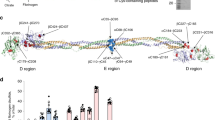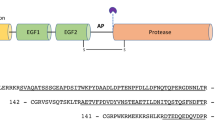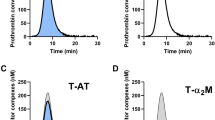Abstract
FROM an investigation into the chemical mechanisms involved in the conversion of fibrinogen into a fibrin gel, it appears that the conversion occurs in at least two stages. The first stage is marked by the liberation of thiol groups in the fibrinogen molecule. The second stage is an oxidation of these thiol groups, which unite to form disulphide linkages with adjacent molecules. It has been found possible to isolate three intermediate products which react when thrombin clots fibrinogen. Thrombin can be divided into two active components which have separate and distinct functions. Neither component will convert, per se, fibrinogen into fibrin; but the mixture of the two will readily clot fibrinogen.
This is a preview of subscription content, access via your institution
Access options
Subscribe to this journal
Receive 51 print issues and online access
$199.00 per year
only $3.90 per issue
Buy this article
- Purchase on Springer Link
- Instant access to full article PDF
Prices may be subject to local taxes which are calculated during checkout
Similar content being viewed by others
References
Craven, R., J. Chem. Soc., 1605 (1931).
Novelli, A., Science, 93, 358 (1941).
Author information
Authors and Affiliations
Rights and permissions
About this article
Cite this article
LYONS, R. Thiol – Vitamin K Mechanism in the Clotting of Fibrinogen. Nature 155, 633–634 (1945). https://doi.org/10.1038/155633a0
Issue Date:
DOI: https://doi.org/10.1038/155633a0
This article is cited by
-
Untersuchungen �ber das Verhalten proteingebundener Sulfhydrylverbindungen des Plasmas bei alternden und katarakt�sen Patienten
Klinische Wochenschrift (1962)
-
Immunologische Eigenschaften der menschlichen mit Heparin präzipitierten Plasmafraktion
Experientia (1960)
-
Chromatographie von Fibrinogen an einer Calciumphosphats�ule
Die Naturwissenschaften (1957)
-
�ber Blutgerinnung und Gerinnungsfaktoren
Klinische Wochenschrift (1950)
-
Enzymatic Control of Cell Division in Micro-Organisms*
Nature (1948)
Comments
By submitting a comment you agree to abide by our Terms and Community Guidelines. If you find something abusive or that does not comply with our terms or guidelines please flag it as inappropriate.



